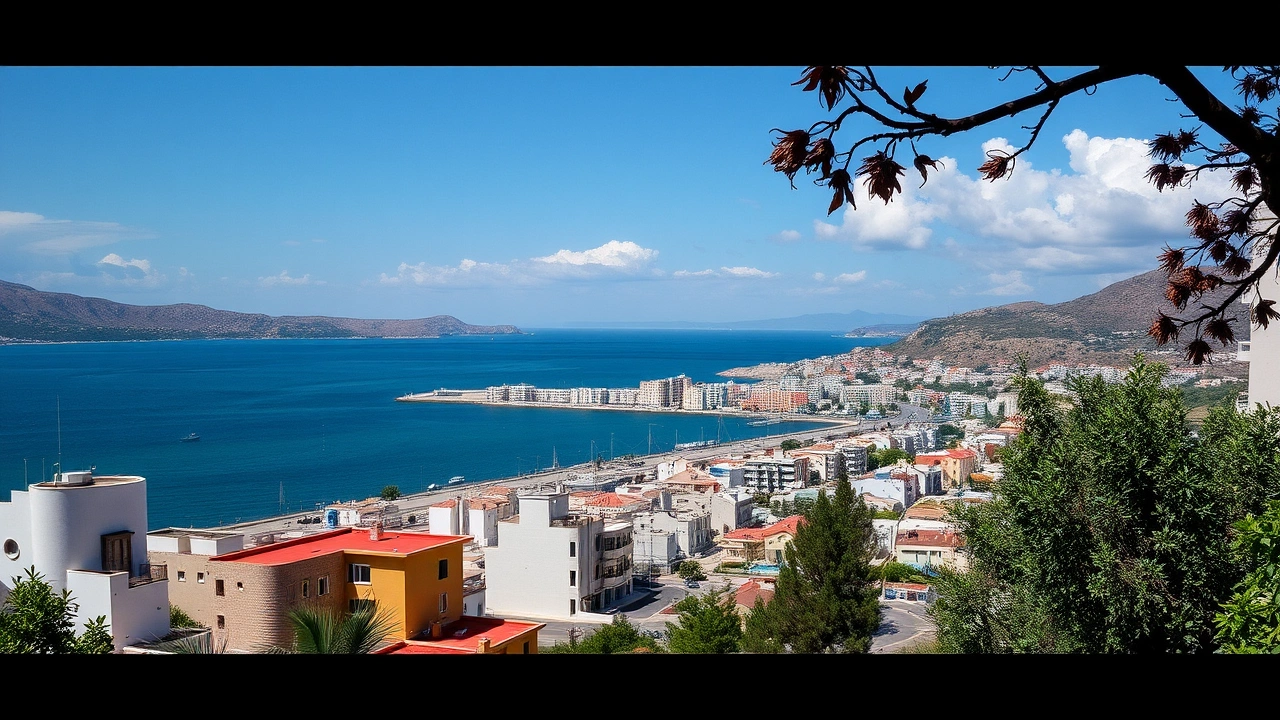
 Published on and written by Cyril Jarnias
Published on and written by Cyril Jarnias
Investing in Bali with a Real Estate Civil Company (SCI)
Investing in Bali, Indonesia’s tropical gem, presents an attractive opportunity thanks to its beautiful beaches and vibrant culture, but how can you turn this dream into reality with a Real Estate Civil Company (SCI)?
This investment strategy, while promising, requires a detailed understanding of the tax benefits it offers as well as potential obstacles to anticipate. However, if well managed, an SCI can enable not only simplified property management but also securing the investor’s legal obligations.
This article will guide you through the lucrative avenues and pitfalls to know, so that investing in Bali can be as serene as its landscapes.
Good to know:
An SCI allows for pooling investments and benefiting from specific tax advantages in Bali.
Optimizing the Legal Structure for Investing in Bali
Various legal structures are available to foreign investors looking to invest in Bali, including:
- PT PMA (Perseroan Terbatas Penanaman Modal Asing): a limited liability company with foreign capital, this is the only structure that legally allows foreigners to own and operate real estate in Indonesia under certain land titles.
- Local PT: reserved for Indonesians or companies majority-owned by Indonesian nationals.
- Representative Office: a limited structure that does not allow direct real estate acquisition.
The Real Estate Civil Company (SCI), common in France, has no official equivalent in Indonesian law. However, some investors draw inspiration from it to create a holding company or a company whose purpose is the collective holding and management of real estate assets through a PT PMA adapted to the local context.
| Structure | Foreign Access | Direct Property Ownership | Possible SCI Adaptation |
|---|---|---|---|
| PT PMA | Yes | Yes | Yes |
| Local PT | No | No | No |
| Representative Office | Limited | No | No |
Specific Benefits of an Adapted SCI (via Holding/PT PMA) for Investing in Bali
- Asset Protection: clear separation between personal assets and those held by the company.
- Flexibility for Real Estate Operations: ease of transferring or selling company shares rather than the property itself; simplified estate planning.
- Ease of Collective Management: multiple partners can organize their governance through customized articles of association, distributing rights and obligations according to their respective contributions.
Relevant Local Legal & Tax Rules
Land Ownership
- Foreigners cannot directly hold the “Hak Milik” title (full ownership).
- Access is through the “Hak Guna Bangunan” title (HGB – right to build), granted to companies like PT PMA. This right is initially granted for up to 30 years with the possibility of extension up to 80 years total.
- Legal obligation to begin development within two years of acquiring HGB.
- Electronic registration now facilitates these procedures.
Taxation
- Rental income taxed between 10% and 20%.
- France-Indonesia tax treaty avoids double taxation for French nationals.
Practical Tips for Creating/Managing an Adapted SCI (PT PMA) in Bali
- Ensure all local partners are reliable through thorough prior due diligence;
- Draft detailed articles of association specifying powers, rights, and entry/exit procedures;
- Provide all required documents during registration:
- Passport,
- Mandatory official business address,
- Details on directors/shareholders;
- Open a professional bank account with a recognized major Indonesian bank;
- Obtain all necessary licenses according to planned activity;
- Plan for competent local legal counsel to adapt each clause to evolving Indonesian requirements;
Common Pitfalls & Proposed Solutions
List of frequent pitfalls:
- Unexpected/frequent changes to the legal framework regarding foreign investments;
- False partnerships with local nominees exposing to major legal risk (“nominee agreements” not officially recognized);
- Inadequate use of land title or failures in complying with regulatory timelines;
Solutions/Warnings:
- Systematically use a locally licensed law firm
- Establish robust contractual documentation from the start
- Regularly monitor legislative/regulatory developments
- Always prefer the official route through creating a proper compliant structure rather than informal arrangements
In summary
To optimize your real estate investment in Bali while protecting your asset interests, it’s absolutely essential to opt for transparent structuring through creating a foreign company like PT PMA—inspired by but legally distinct from a French SCI—while relying on knowledgeable professional support to remain compliant with the rapidly evolving Indonesian legal framework.
Good to know:
In Bali, foreign investors can choose from various legal structures, including the Real Estate Civil Company (SCI), which, although of French origin, adapts to the Indonesian context. The SCI offers benefits such as asset protection, simplified management, and increased flexibility for real estate transactions. However, it’s crucial to comply with local standards, where direct land ownership by foreigners is often restricted, requiring arrangements such as leasehold agreements, while an SCI can offer certain legal protection. To establish an SCI in Bali, it’s essential to work with reliable local partners while ensuring legal compliance to avoid pitfalls such as frequent legislative changes or false partnerships. Investors are encouraged to stay informed about law changes and ensure they have comprehensive legal documentation to minimize associated risks.
The Benefits of Buying Real Estate in Bali via an SCI
Buying real estate in Bali via an SCI (Real Estate Civil Company) offers several major advantages for foreign investors, both in terms of taxation and asset protection.
Tax Optimization Through SCI Tax Transparency
- The SCI is fiscally transparent: it’s not the company’s profits that are taxed, but those of the partners proportional to their shares. This allows for optimizing the overall tax burden, particularly when held by multiple members of the same family.
- By choosing Income Tax (IR) taxation, it’s possible to apply certain tax strategies like updating the acquisition price or gradual share transfer to significantly reduce capital gains tax upon resale.
- Rental income generated by property leased in Bali already benefits from relatively low local taxation (often less than 10%), making the structure even more attractive for French investors looking to avoid heavy double taxation.
Facilitated Transfer and Absence of High Fees
The main asset advantage lies in the possibility of gradually transferring company shares rather than the real estate property itself. This approach allows for organizing succession in advance and avoiding exorbitant or blocking fees for heirs.
For example, an investor can transfer a portion of shares to their children each year without immediately triggering significant taxation; this proves particularly effective in an international context where inheritance rules can be complex and costly.
Benefits in Collective Management and Control
Freely drafted articles of association provide partners with a secure framework: flexible distribution of powers between managers and partners, clear voting organization, and protection against certain internal conflicts.
To illustrate: two French friends who jointly acquired a Balinese villa via an SCI were able to precisely define their respective responsibilities as well as an automatic mechanism in case of major disagreement regarding the property’s rental operation.
| Advantage | Description |
|---|---|
| Taxation | Transparency allowing IR/IS optimization; combined with reduced local taxation |
| Transfer | Gradual transfer without high fees; facilitated succession planning |
| Management | Adaptable articles: precise control between co-partners |
Protection Against Foreign Legislative Changes
Using an SCI as a holding structure acts as a “shield” against certain sudden or unexpected changes in Indonesian law. Even if Indonesia imposes various constraints on foreigners (long-term leases, mandatory local partnerships), indirect holding through a French company provides relative legal stability: it’s primarily French law that governs internal relations between partners.
Concrete anecdote: A French-Belgian couple was able to continue their rental operation serenely despite temporary tightening of Balinese land regulations because their contract was legally backed by French civil code through their SCI established before their acquisition.
Increased Legal Stability
The contractual flexibility offered by the SCI also protects against local political uncertainties: while an individual might see their title challenged following local regulatory changes, they remain protected by their articles of association registered with a French notary—providing an additional legal safety net rarely available otherwise in these latitudes.
In summary:
- Direct tax optimization
- Simplified transfer without heavy taxes
- Total control through adapted articles
- Enhanced protection against foreign uncertainties
These advantages explain why many experienced investors now prefer this vehicle for investing serenely in Balinese real estate while securing transgenerational family assets.
Good to know:
Buying real estate in Bali via a Real Estate Civil Company (SCI) offers several notable advantages for investors. Indeed, an SCI provides tax transparency allowing for tax optimization, which is particularly beneficial for avoiding double taxation often encountered by foreign investors. Additionally, the ease of transferring real estate assets through an SCI without bearing heavy Indonesian inheritance taxes is a major advantage, making the transfer process more economical and simplified. In terms of management and control, an SCI allows foreign investors to better master their investment while limiting personal liability. Finally, facing possible fluctuations in Indonesian land laws, an SCI offers certain legal stability, thus protecting long-term investments. For example, investors have found that, thanks to the SCI structure, they managed to secure their property despite legislative reforms that might otherwise have affected their legal status as foreign owners.
Tax Optimization: A Lever for Investing in Bali
Tax optimization in Bali offers numerous advantages for investors, particularly through structuring investments via a Real Estate Civil Company (SCI) or other local entities like PT PMA. These mechanisms secure operations while maximizing net profitability.
Main Advantages of Tax Optimization via SCI and Local Structures:
- Significant reduction in tax rate through using a local company, with rates generally between 10% and 20% on rental income.
- Simplified real estate taxation, particularly with low property tax (approximately 0.5% of declared value).
- Possibility to deduct certain expenses (maintenance, insurance) to optimize taxable income.
- Increased legal security for foreign investors.
- Absence of income tax for non-residents in certain specific cases.
Favorable Tax Specifics in Indonesia:
| Type of Tax | Indicative Rate | Main Remarks |
| Property Tax | ~0.5% | Based on declared property value |
| Tax on Rental Income | 10-20% | Varies by structure and tax status |
| Real Estate VAT | Sometimes applicable | Depending on project nature |
Indonesia has signed double taxation treaties with several European countries including France. This allows French investors, for example, to avoid double taxation on their real estate income generated in Bali.
Practical Tips for Optimizing Your Taxation:
- Prefer structuring via SCI or PT PMA to fully benefit from local exemptions and deductions.
- Carefully choose your acquisition type (Leasehold/Hak Pakai) as this directly impacts applicable tax regime.
- Maximize use of tax incentives available in certain tourist zones or new projects sometimes offering temporary reductions.
- Ensure all contracts comply with Indonesian legislation to avoid unfavorable tax reclassification.
Common Tax Pitfalls to Avoid:
- Underestimating potential impact of currency fluctuations during repatriation or conversion of received rents;
- Neglecting declaration obligations in home country despite anti-double taxation treaty;
- Omitting certain additional local taxes that may apply depending on exact property type;
- Relying solely on offshore structuring without prior verification with qualified local expert.
Absolute Importance:
Strictly respecting all Indonesian regulatory obligations remains paramount. Non-compliance can lead to heavy financial penalties or even partial or total invalidation of real estate title. Planning done from the start with specialized counsel guarantees legal security and durable optimization.
Good to know:
Tax optimization in Bali via an SCI can offer significant advantages through judicious investment structuring, particularly thanks to double taxation treaties between Indonesia and several countries, which can avoid taxation on the same income in two jurisdictions. Indonesia offers attractive tax incentives, such as partial tax exemptions for income from certain key economic activities, which can be a lever to maximize profits. However, investors should be aware of local taxes, such as corporate tax and property tax, and comply with Indonesian regulations to avoid penalties. It’s crucial to understand local tax mechanisms, like carrying forward or deducting certain expenses, to derive maximum benefits, but beware of pitfalls like complex structures that can lead to non-compliance risks.
Avoiding Corporate Law Pitfalls in Bali
Creating a real estate civil company (SCI) in Bali for a foreigner involves navigating a strict Indonesian regulatory framework distinct from European or North American legal systems.
Specific Regulations Applicable to Foreigners:
- Foreigners cannot directly own land in Indonesia, including Bali. Land ownership is reserved for Indonesian citizens.
- To circumvent this prohibition, certain structures such as creating a local company (PT PMA – Penanaman Modal Asing) are sometimes used but don’t correspond to the French SCI model and involve complex foreign investment regulations.
- Any attempt to use local nominees (“nominee agreements”) to indirectly hold real estate is risky as these practices are illegal under Indonesian law. If discovered, consequences can include property confiscation.
Balinese Legal Particularities:
- Property acquisition by a company requires involvement of a local partner who officially holds the land title. The partnership must respect forms provided by Indonesian law, otherwise it can be declared void.
- Local laws strongly emphasize respect for Balinese traditions and any real estate project must account for strict customary rules regarding land use and construction.
Comparison with Other International Legal Systems:
| Aspect | Indonesia/Bali | France (Classic SCI) |
|---|---|---|
| Land Ownership | Reserved for nationals | Open to all |
| Real Estate Company | PT PMA structure possible but strict | SCI widely used |
| Nominee | Illegal | Sometimes used legally |
| Local Partnership | Mandatory | Not necessary |
Potential Tax Risks:
- Risk of double taxation if financial flows between the Indonesian company and its foreign partners aren’t properly structured.
- Possible application of heavy penalties in case of tax reclassification or irregularities in arrangements used to circumvent local land law.
- Indonesian tax administration closely monitors real estate transactions involving non-residents.
Carefully prepare all required documents, particularly those related to investor visa if you wish to manage your structure on site.
Ensure each step respects both national and regional Balinese law to avoid any subsequent administrative cancellation or criminal penalty.
Practical Checklist:
- Consult with BKPM (Badan Koordinasi Penanaman Modal – National Investment Agency)
- Obtain advice from specialized local lawyers
- Avoid any solutions based on illegal arrangements with nominees
- Plan regular audits of tax obligations
Systematically consulting a specialized local law firm is essential to secure your real estate project in Bali. Professional support not only helps avoid costly errors but also adapts your asset strategy to the evolving Balinese regulatory context.
Good to know:
To avoid corporate law pitfalls in Bali when considering creating a Real Estate Civil Company (SCI), it’s essential to thoroughly understand local regulations, particularly those limiting land ownership for foreigners. In Bali, foreigners cannot directly own land, which often requires partnering with a resident or using structures like Hak Pakai (right of use). Specific requirements, such as mandatory involvement of an Indonesian local partner, can surprise those accustomed to other legal systems. Due to these complexities, and to navigate tax risks, it’s strongly advised to consult Balinese legal experts to adapt your investment strategy, maximize tax benefits, and avoid costly errors in administrative procedures.
Disclaimer: The information provided on this website is for informational purposes only and does not constitute financial, legal, or professional advice. We encourage you to consult qualified experts before making any investment, real estate, or expatriation decisions. Although we strive to maintain up-to-date and accurate information, we do not guarantee the completeness, accuracy, or timeliness of the proposed content. As investment and expatriation involve risks, we disclaim any liability for potential losses or damages arising from the use of this site. Your use of this site confirms your acceptance of these terms and your understanding of the associated risks.















































